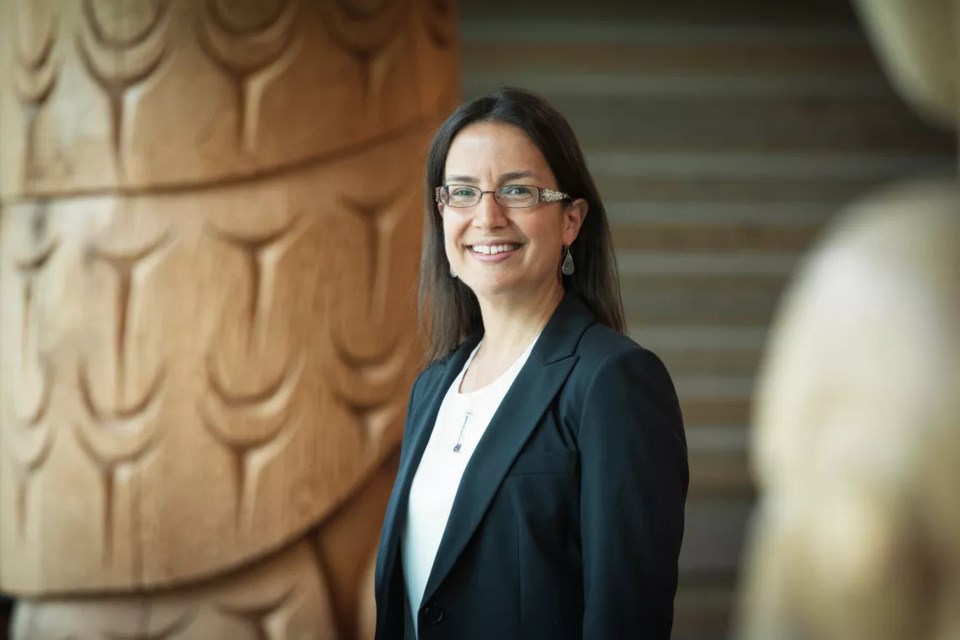Dr. Nadine Caron, a professor at the University Hospital of Northern British Columbia (UHNBC), was one of six Canadians inducted into the Canadian Medical Hall of Fame on June 19.
Her contributions to oncology research, surgical practice, and Indigenous health — both in the North and across Canada — have been widely recognized.
Caron currently works as a surgical oncologist and focuses her efforts on breaking down barriers in medicine and health-care services in remote northern communities.
A member of the Sagamok Anishnawbek First Nation, she holds the distinction of being the first Canadian female general surgeon of First Nations descent, as well as the first female First Nations graduate of the University of British Columbia’s medical school.
She has served as the First Nations Health Authority Chair in Cancer and Wellness at UBC and has participated in numerous health-based committees, including the Native Physicians Association of Canada and the British Columbia Medical Association’s committee on health.
Speaking with The Citizen about her upcoming induction, Caron said the recognition came as a surprise.
“To be honest, I was shocked,” she said. “Obviously, I was very honoured to hear it, but I think it was an equal mixture of just the shock of the announcement and being really touched by the people who were behind this to make it happen.”
Her path to medicine began through athletics.
“I went to Simon Fraser University and got my degree in kinesiology while I was playing varsity basketball there — and even a year of varsity soccer,” she said. “I really enjoyed studying the human body, physiology and anatomy, but I was focused on my sport. Then as I approached the end of my university career, I had to figure out the next step. I had the opportunity to shadow a general surgeon down in Tennessee of all places, and realized very quickly, after scrubbing in on my first operation, that this was what I wanted to do.”
From there, her medical career took off. Caron earned her MD from UBC as a top-ranking student, followed by a Master of Public Health from Harvard University — completed while she was doing her surgical residency — and a postgraduate fellowship in endocrine surgical oncology at the University of California, San Francisco.
She said one of the highlights of her career was the mentorship she received along the way.
“I absolutely loved medical school and surgery residency at UBC,” she said. “I learned so much and sort of buckled in for a real lifetime experience at Harvard for my master’s in public health. Then I finally finished my formal training at UCSF, doing my endocrine surgery training with an icon of surgery, Dr. Orlo Clark.
“Just an icon — who demonstrated that you could be a world-renowned surgeon and still be known for your dedication to your family, your love of art, and your sense of humour. He was the full package, and it was a real honour to meet him.”
One of Caron’s most enduring goals has been to identify and correct gaps in rural and Indigenous health care — particularly across the North.
She first noticed some of these gaps while spending time at the Centre for American Indian Health at Johns Hopkins University in Baltimore.
“That centre offered public health courses for Indigenous community members across the United States — something I found didn’t exist in Canada,” she said.
In response, she helped create the Certificate in Indigenous Public Health, a program hosted at UBC that brings in 25 students each February and August to take Indigenous-specific public health courses.
She also continues to work extensively in oncology, which she says is a deeply meaningful part of her practice.
“Ninety per cent of the patients I see are either for cancer screening or cancer treatment,” she said. “I’m seeing individuals at a very stressful time, and I’m so honoured that they trust me enough to share their stories. From a clinical point of view, that is a tremendous honour — and so rewarding.”
She added that teaching and research are also fulfilling aspects of her work.
“Being able to ask questions and seeing the research capacity in Canada grow to better listen to Indigenous questions and voices — I think that’s improved over the years,” she said. “We have a long way to go, but we now have some examples of success that we can fall back on.
“I also think that teaching medical students at the Northern Medical Program, and seeing how that program has evolved and the students it’s produced, is incredibly rewarding.”
Caron said she wouldn’t be where she is today without the support of her parents and the inspiration she draws from her daughter, Aliah Turner.
“She’s my inspiration,” she said. “I think everyone should work to make the world a better place for their kids, and every time I see Aliah, I know that it’s worth it.”



